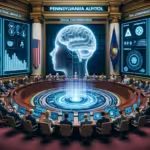Understanding Pennsylvania’s Legislative Focus on AI in 2023
In recent years, artificial intelligence (AI) has emerged as a transformative force across various sectors, and now, lawmakers in Pennsylvania are emphasizing the urgency of addressing AI advancements and challenges within the state. As a result, 2023 marks a crucial year for AI development and regulation in Pennsylvania. State legislators are pushing for comprehensive strategies to harness AI’s potential while ensuring responsible use.
The Growing Importance of AI in Pennsylvania
AI technologies are reshaping industries and redefining the way businesses operate. In Pennsylvania, the integration of AI into various sectors is accelerating, leading to numerous benefits such as increased efficiency, enhanced productivity, and innovation. Some major industries experiencing the impact of AI include:
- Healthcare: AI is revolutionizing patient care with its applications in diagnostics, treatment planning, and personalized medicine.
- Manufacturing: AI-driven automation is improving operational efficiency and reducing production costs.
- Energy: AI aids in optimizing resource management and boosting sustainable practices.
Additionally, the burgeoning tech industry in cities like Pittsburgh and Philadelphia underscores Pennsylvania’s commitment to becoming a hub for technological advancement.
Challenges Accompanying AI Integration
While the advantages of AI are considerable, they come with significant challenges that lawmakers and regulators must address. The potential pitfalls include:
- Ethical Concerns: Ensuring that AI systems are fair and unbiased remains critical, particularly in sensitive areas such as hiring and law enforcement.
- Data Privacy: AI’s reliance on large datasets raises concerns about data security and individual privacy.
- Job Displacement: Automation can lead to job displacement, necessitating efforts toward workforce reskilling and adaptation.
These challenges call for thoughtful deliberation and strategic regulatory measures to mitigate the potential downsides of AI integration.
Legislative Actions and Proposals
Recognizing the strategic importance of AI, Pennsylvania lawmakers are actively working on regulations and initiatives to ensure responsible AI advancement. Key proposals under discussion include:
- Comprehensive AI Policy Framework: Establishing a structured policy framework that outlines the ethical and responsible use of AI technologies.
- Data Privacy Legislation: Proposing robust data protection laws that safeguard individuals’ personal information in the AI ecosystem.
- Education and Workforce Development: Initiatives aimed at enhancing AI education and training programs to equip the workforce for the future.
These efforts are intended to shape a balanced approach that focuses on innovation while safeguarding societal values.
The Role of Public-Private Partnerships
Public-private partnerships are essential in advancing AI initiatives in Pennsylvania. By collaborating with industry leaders, educational institutions, and tech companies, the state can leverage resources and expertise to foster innovation. Effective partnerships can result in:
- R&D Collaborations: Joint research efforts to develop cutting-edge AI solutions that address local and global challenges.
- Investment in AI Startups: Supporting emerging AI startups to drive growth and job creation.
- Knowledge Sharing: Facilitating the exchange of best practices and insights between the public and private sectors.
Such collaborations can enhance the competitiveness of Pennsylvania’s AI landscape and position the state as a leader in technological innovation.
Impact on the Workforce and Education
One of the major concerns around AI is its impact on the workforce. As AI continues to automate tasks and processes, there is an increasing need to prepare the workforce for an AI-driven future. Key strategies include:
- Reskilling Programs: Implementing targeted reskilling programs to help workers transition to new roles in the AI economy.
- Emphasis on STEM Education: Enhancing STEM (science, technology, engineering, and mathematics) education to build a skilled workforce capable of thriving in AI-related fields.
- Industry-Academia Collaborations: Encouraging partnerships between academic institutions and industry to develop relevant AI curricula and research initiatives.
By proactively addressing workforce implications, Pennsylvania can ensure that its labor market remains agile and competitive.
Conclusion: A Pivotal Year for AI in Pennsylvania
As Pennsylvania navigates the complexities of AI integration, 2023 stands as a pivotal year for shaping the future of AI in the state. By focusing on regulatory frameworks, emphasizing ethical considerations, fostering public-private collaborations, and investing in education and workforce development, Pennsylvania lawmakers are laying the groundwork for a sustainable and innovative AI landscape.
Ultimately, Pennsylvania’s proactive steps in AI governance not only safeguard its residents but also set the stage for the state to become a leading force in the AI revolution. Through strategic initiatives and collaborative efforts, Pennsylvania can leverage AI to drive economic growth and societal progress for years to come.








